Once more, we’re drowning in a season of shooters: the jazzy robo-parkour of Titanfall 2, the eco-pocalyptic hustle of Gears of War 4, the anthologized toil of Battlefield 1. And on November 4 for PC, PlayStation 4 and Xbox One, the slick celestial operatics of Call of Duty: Infinite Warfare. It’s the thirteenth installment in Activision’s granddaddy projectile-chucker that’s been nipping at Pokémon‘s fourth place heels in the battle for all-time bestselling franchise bragging rights.
Slick as in customarily brisk, predictably explosive and sociopolitically anodyne. If last year’s cyberpunk Black Ops III by alt-subsidiary Treyarch dared to broach protocol by disappearing down quasi-existential rabbit holes, studio Infinity Ward’s sci-fi shooter rights course by acid-washing any nuance from its galloping potboiler. It’s a tale of one-dimensional interplanetary insurgents reduced to no-dimensional quarry — blockades of human or robotic militants jammed into moon base corridors or crowding orbital arenas, meat-or-metal-bags of variable lethality interposed between you and the next achievement unlock.
It’s also the story of your battle with Rear Admiral Salen Kotch (played by Game of Thrones‘ Kit Harington), a disaffected Martian radical about which those four words are all the game ever gives you. He appears a few times over the course of events, mostly in propaganda videos, glacially speechifying in rote soliloquies garnished with insipid little dictums like “freedom is cowardice” and “death is no disgrace.”
We’re clearly meant to view Kotch as evil of the reductively unbridled sort, his followers mere lobotomized minions worthy of nothing save the bottom of our boots. That’s Infinite Warfare‘s grand insight: trample or be trampled, all the while basking in the spectacular views.
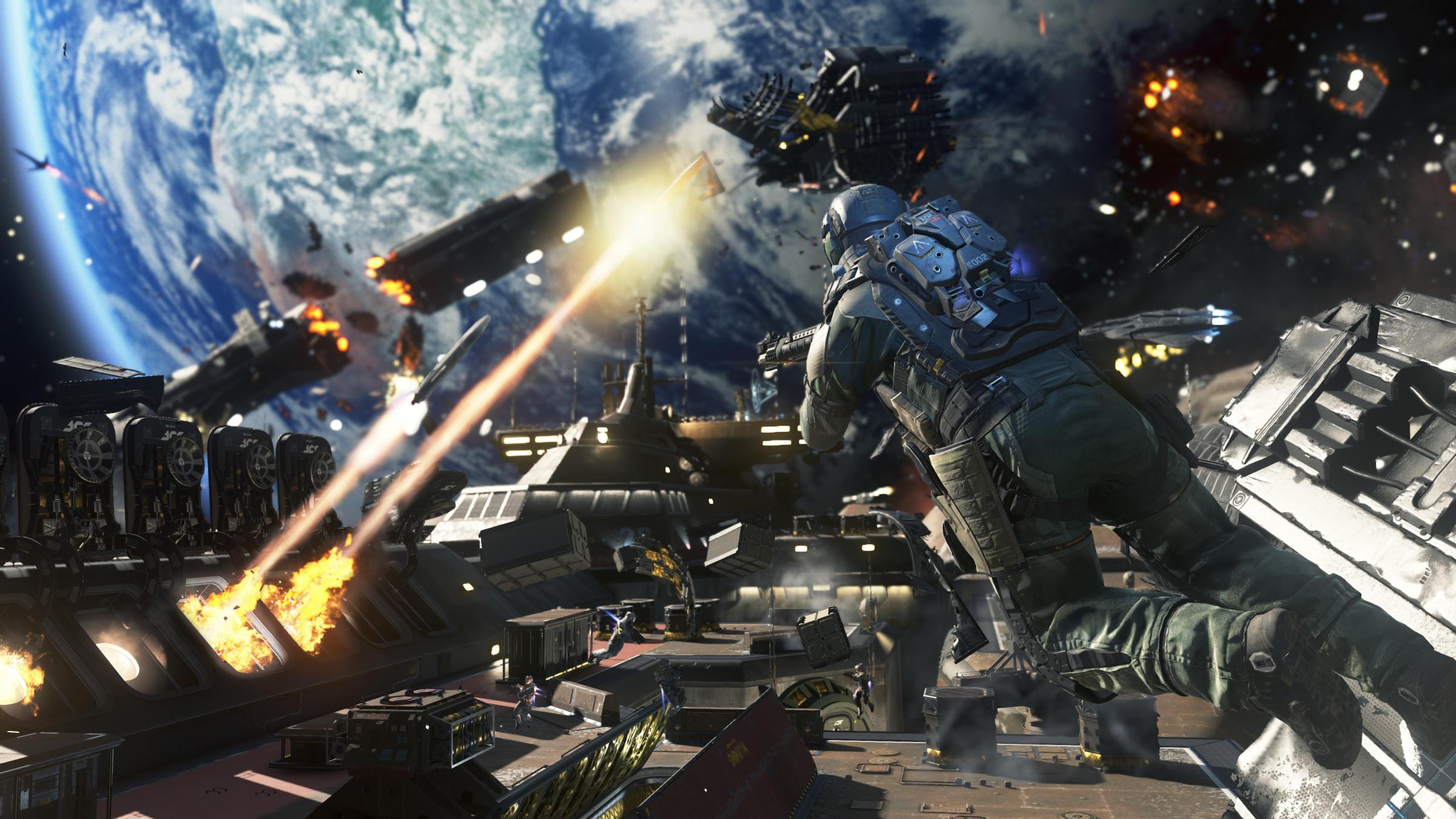
Forget the plot — the game doesn’t seem to mind — and you’re left with a shooter that plays like a service update to last year’s hub-driven military adventure, scaled up to encompass the entire solar system. From the deck of your capital ship, you’ll zip from planet to planet, launching fighter assaults or anti-gravity skirmishes or enemy carrier breach assaults that feel like all the things we’ve done before in these games with a few new tricks.
Thus anti-grav grenades can now fling squadrons into the air for fish-in-a-barrel execution, though even when the game’s lobbing platoons at you, this feels unfairly advantageous. Explosive-packing spider drones that scamper after hapless foes basically do at the ground level what Advanced Warfare‘s heat-seeking grenades could from on high. You can momentarily hack and possess enemy robots, advance from behind beehived nano shields and launch weaponized copter drones that serve as pitiless escorts, but none of these much alter the cover-pop ebb and flow of gunplay. It’s like driving a year-newer model of your go-to ride. You get a few curious frills on the dash, but the knock-on effects barely register.
The biggest shift, the addition of freeform flight, turns in an arcade experience that dithers between competent and a muddle. During these stages, which comprise roughly one-third of the total campaign and often intermingle with traditional run-and-gun missions, you slip behind the controls of a space fighter that controls like a hovercraft. That’s the best I can say about flight in Infinite Warfare — ships are responsive and directionally unhindered, say you want to backup or strafe instead of always nosing forward.
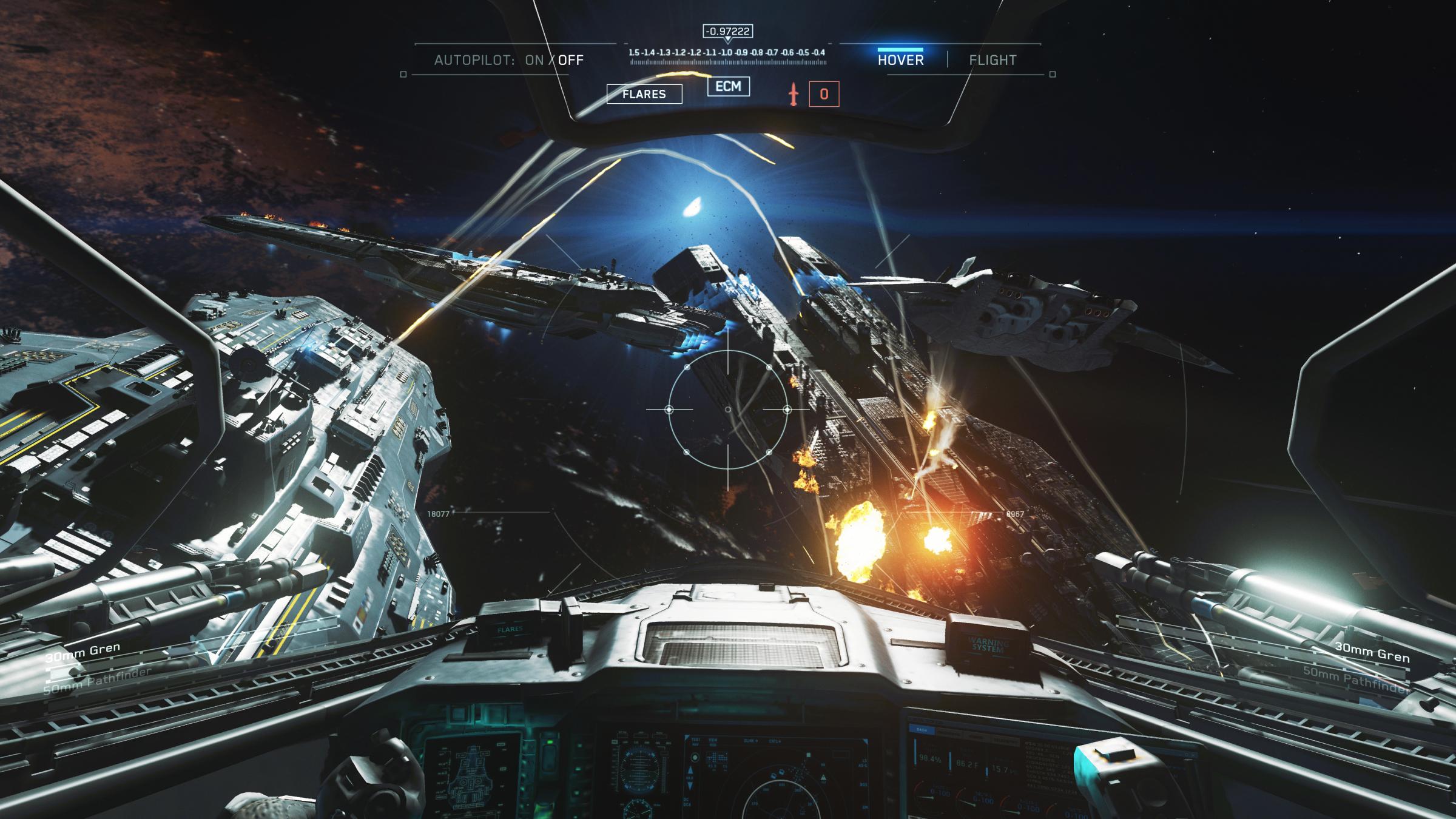
But the space battles are titanic tangles of information, sprawling debris fields so cluttered and dimensionally squashed that they obscure your goals and obliterate any sense of proximity to targets. That would be fine, if ships had heads-up markers with distance tracking and everyone moved at speeds that made those metrics worth having. Instead, in the interest of Call-of-Dutifying these sessions, you have no radar, ships scream out of or vanish into the chaos, and you’re left to wrestle with an interface instead of gratifying tactics.
Most dogfights go like this: identify a distant colored blip, pursue, take near-lethal damage from a surprise bogey, wheel 180 degrees, then liquidate your pursuer in a hail of bullets-slash-missiles. Events unfold too fast and relentlessly furious for thoughtful play, reducing maneuvers to defense, and defense to triage. It’s a shooter’s exuberant but confused apprehension of arcade flight.
And yet there are bits of design elegance in the game, moments at which it manages to slip the surly bonds of habituated mediocrity. The first time you slip from the cockpit of your Jackal into zero gravity, for instance, maneuvering between asteroids with micro-thrusters as enemy spotlights stalk from above. Or creeping along the other side of that field, approaching the hull of a massive capital ship, wrenching open an airlock door and stealing inside. Or flinging your gravitationally spectral self across scorching exposed spaces at the coronal fringes of the sun, doing battle on a rock that’s spinning so fast days and nights pass in seconds.
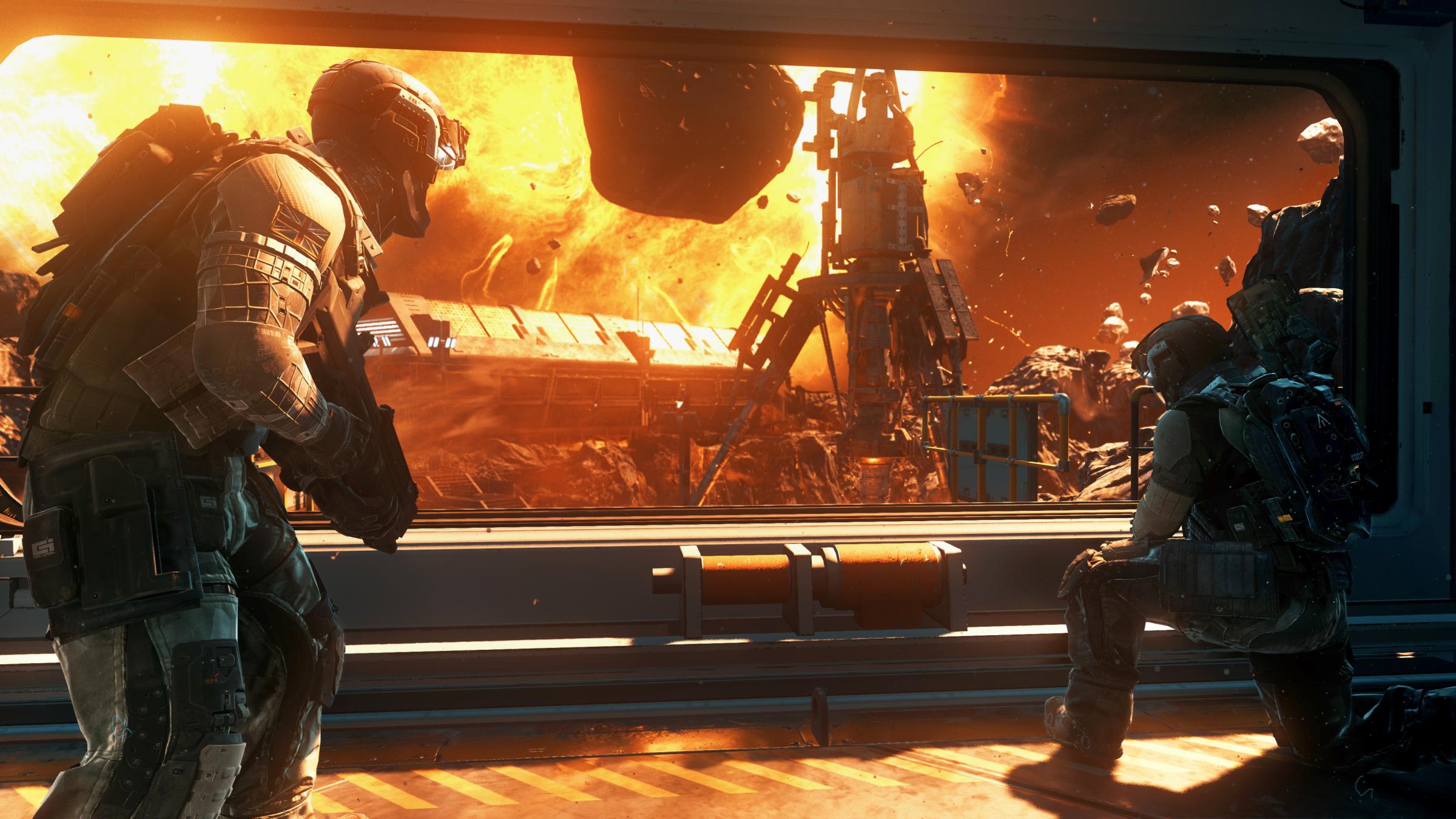
It’s just a shame Infinity Ward turned what could have been its Star Wars moment into something more like a Battle Beyond the Stars one. I wouldn’t blame Kit Harington, by the way. Kevin Spacey and Christopher Meloni got plenty of screen time to act their way past all the writing cliches in the last two games. In Infinite War, Harington gets virtually none. He’s a boogeyman on a screen, a demagogic presence that solarizes onto your helmet’s view screen a handful of times to spout a few platitudes before vanishing back into the generic recursions of his nihilism.
You’d think, after the superior campaign in Black Ops III, that a franchise this popular and accomplished and supported (the number of people in the credits roll is beyond movie blockbuster staggering), with billions in its coffers, could have done better.
This year’s alt-shooting Zombies mode, in which waves of shambling monsters assault players defending zones solo or in small groups, helps round things out if you’re hip to these goofy branch games that function apart from the series’ military-minded trunk (some people play Call of Duty just for this stuff). Bolting from last year’s purgatorial time-spaghetti plot for the loopy 1980s, this version imagines that characters voiced by Jay Pharaoh, Seth Green, Ike Barinholtz and Sasheer Zamata are trapped in a splatter film controlled by a zany director played by Paul Reubens.
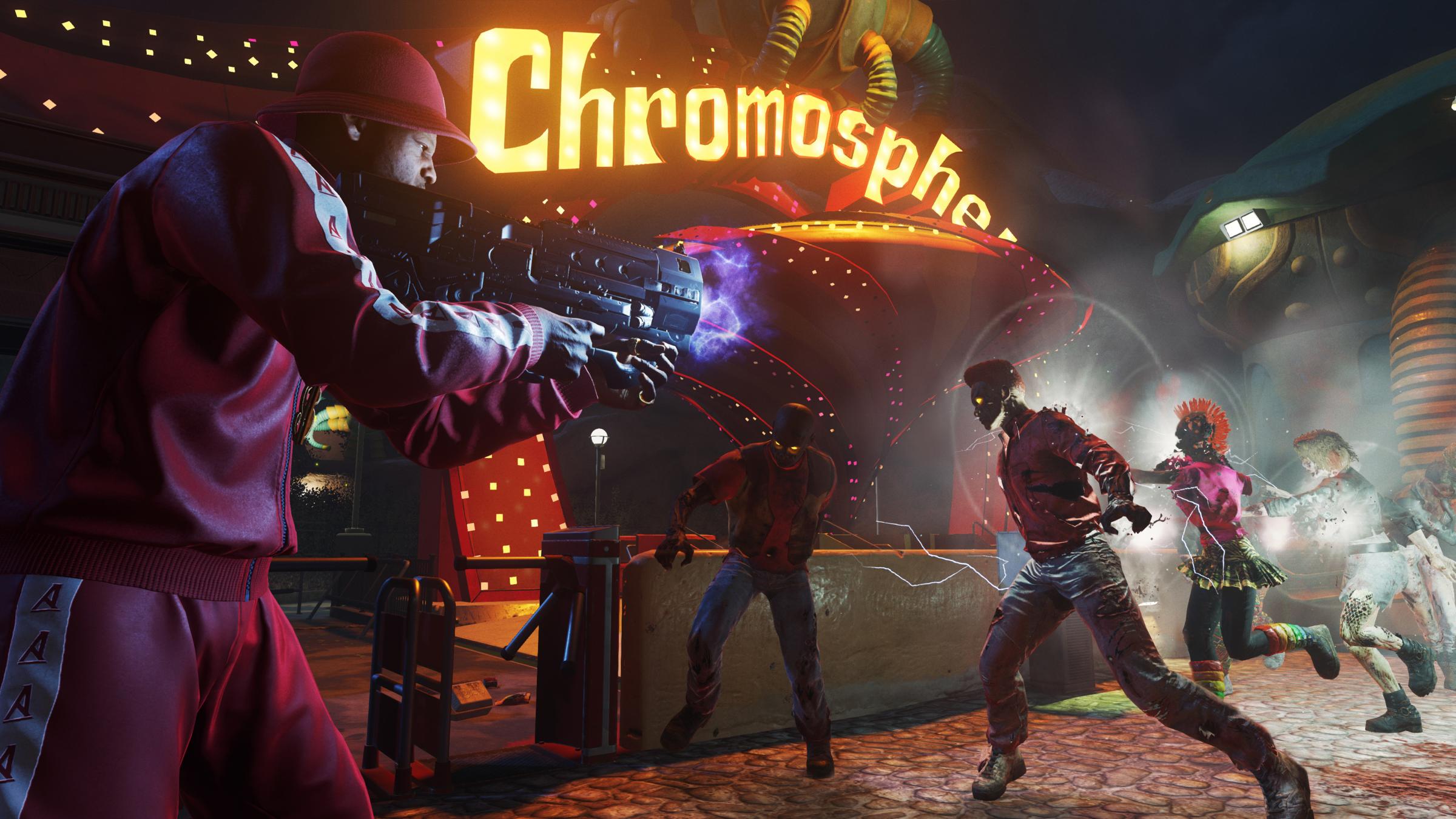
It’s the same old grindhouse that’s best played with pals, though with clever wrinkles that for instance let you co-purchase doors with a teammate (to unlock new pathways), share cash via ATMs and land bonus powers by playing “fate and fortune” cards (replenished by visiting fortune tellers, no less). It’s solid gold compared to the sci-fi campaign, and thematically (like, totally) a hoot.
Multiplayer likewise feels like an operation so smoothed by the footfalls of untold numbers of designers that you’ll have to look to fanatics or esports wizards for plausible nitpicks. “Combat rigs” replace Black Ops III‘s individualized “specialist” characters, riffing on a multiplayer trope that reaches back to the Future vs. Fantasy add-on for id Software Quake. The classes on loan up front – warfighter, merc, synpatic – cover the basics, the incentive being to level up and unlock the quirkier connoisseur alternatives.
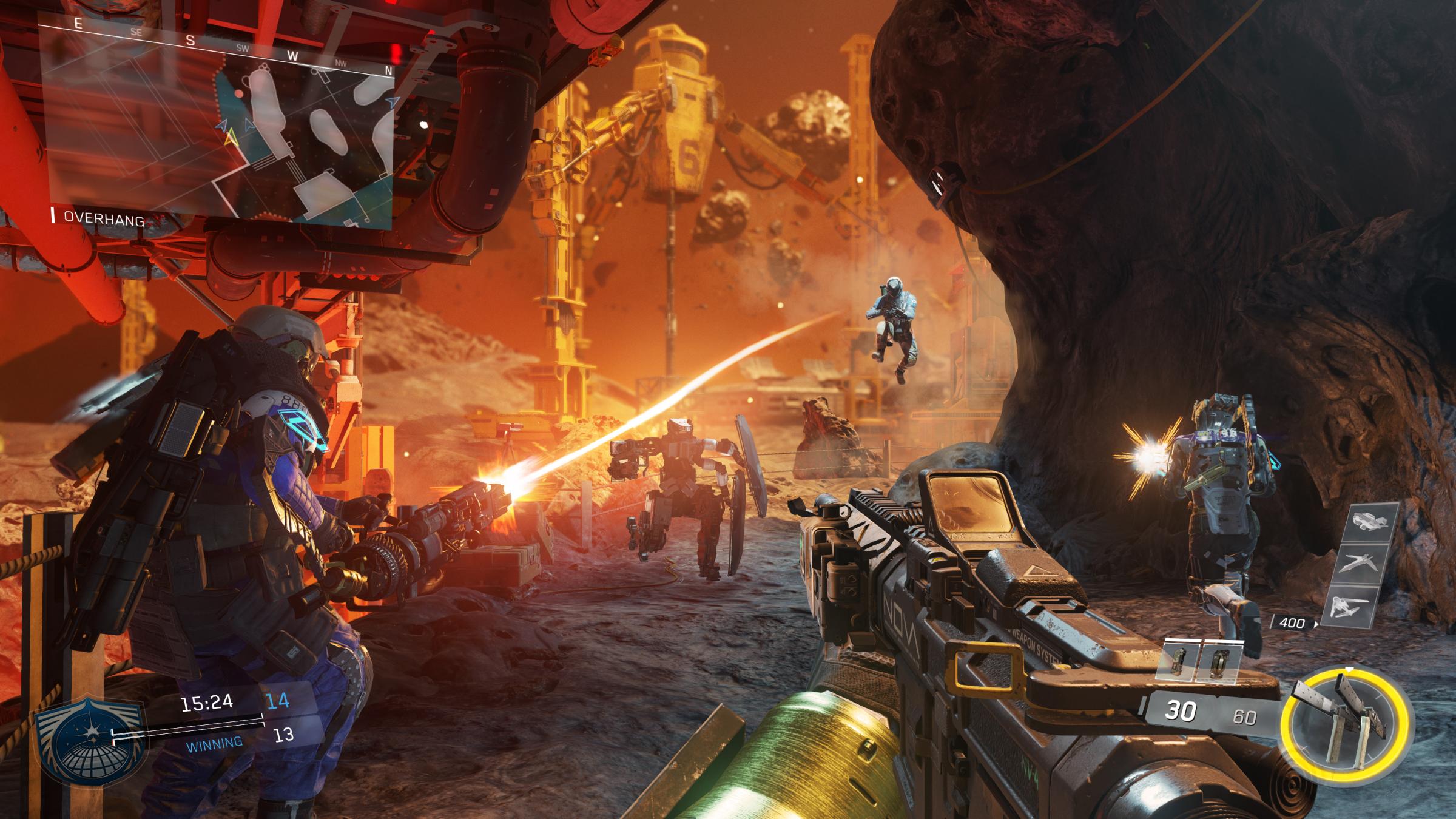
It’s also nice to see tiered weapons crafting, whereby you can assemble “prototype” versions of archetypal firearms by spending “salvage” earned during missions (or from weapons dupes). This lets you pad out attributes like accuracy and range, but also introduces perks that passively augment your abilities or pass along bonuses if you perform certain feats in combat.
I should add that the servers were populous and smooth throughout my test sessions, but it’s an all but unspoken disclaimer that connections could be glitchy for a few days after millions of consumers join the fray.
An assemblage of hits and misses, that’s the measure of this year’s Call of Duty. I could say something about publisher Ubisoft pulling back from its annualized Assassin’s Creed franchise, or how even Doctor Who gets a break. But it’s probably simplest to remind that it’s shooter season, and this year, the alternatives are formidable.
2.5 out of 5
Reviewed on PlayStation 4
Buy Call of Duty: Infinite Warfare for PC here
Buy Call of Duty: Infinite Warfare for PlayStation 4 here
Buy Call of Duty: Infinite Warfare for Xbox One here
More Must-Reads from TIME
- Donald Trump Is TIME's 2024 Person of the Year
- Why We Chose Trump as Person of the Year
- Is Intermittent Fasting Good or Bad for You?
- The 100 Must-Read Books of 2024
- The 20 Best Christmas TV Episodes
- Column: If Optimism Feels Ridiculous Now, Try Hope
- The Future of Climate Action Is Trade Policy
- Merle Bombardieri Is Helping People Make the Baby Decision
Write to Matt Peckham at matt.peckham@time.com